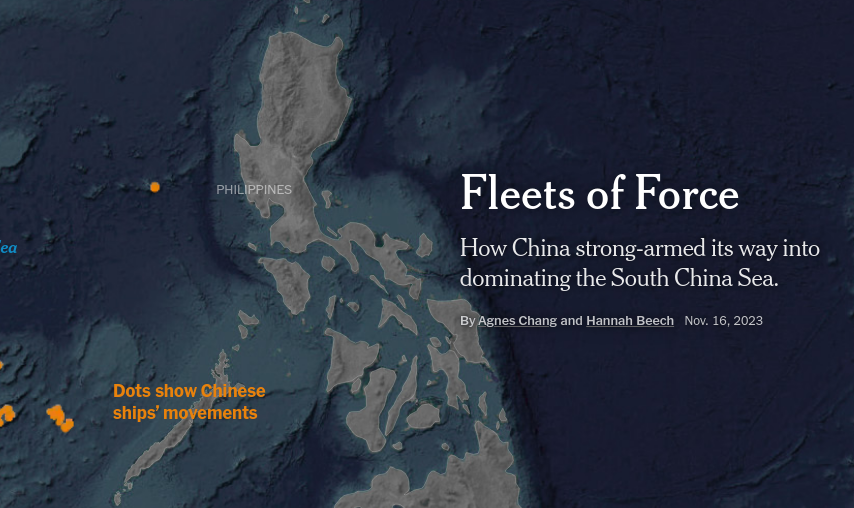
Adding to the list of incidents resulting from aggressive Chinese behavior at sea, Australian divers were injured in the waters of Japan’s exclusive economic zone by a Chinese naval vessel operating their sonar in a harmful way. This occurred after the Chinese had been advised of the divers presence in the water. Sky News Australia reports:
The Australian navy ship again advised the Chinese destroyer that it had divers in the water and requested it stay away but the calls were ignored, placing the divers in danger.
“Soon after, it (Chinese destroyer) was detected operating its hull-mounted sonar in a manner that posed a risk to the safety of the Australian divers who were forced to exit the water,” a Defence Ministry statement said.
Jack Mahony. “Australian naval divers sustain minor injuries after Chinese warship engages in ‘unsafe and unprofessional’ interaction. Skynews.com.au. November 18, 2023.
The Hindustan Times has a video montage of the story including footage from the Royal Australian Navy:
We continually hear about unsafe and aggressive naval and air operations conducted by Chinese craft. The New York Times recently ran an excellent visual story of Chinese maritime activity, “Fleets of Force”. including an image showing how Chinese ships encircled a Philippine coast guard ship on its way to Second Thomas Shoal.

The situation has become so frequent and alarming that recently the government of India raised hackles. Newsweek reports:
“The fragile security situation in the South China Sea, where the growing number of instances of bullying of smaller navies, including fishermen, by the Chinese militia or its navy…poses a clear and present danger to the good order and discipline at sea,” said Adm. Hari Kumar, the Indian Navy’s top uniformed officer
“India Chides China for Bullying at Sea: ‘Clear and Present Danger’. Newsweek. November 17, 2023.
This is happening at the same time Xi Jinping is making a diplomatic push in San Francisco. Sadly, it might be that Xi was able to sweet talk President Marcos of the Philippines. From Yahoo! News (Bloomberg):
“We really should view this as a work in progress. It’s a process,” Marcos told reporters Friday after a pull-aside meeting with Xi in San Francisco where both leaders are attending the Asia-Pacific Economic Cooperation summit. While both agree that the South China Sea issue shouldn’t be the defining element of the two nations’ relationship, “the problems remain and it is something that we need to continue to communicate,” he said.
Yap and Calonzo. “Marcos Says South China Sea a ‘Work in Progress’ After Xi Talk”. Bloomberg. November 17, 2023.
Blame in the Water
In the movie Jaws, the civic leaders of a small town look for every reason to keep the beach open for their big tourist season, while the new police chief does his best to protect the residents and tourists from a murderous shark. Every excuse is found to keep the beach open, including placing the blame on another shark that is caught. The blind hopefulness is rewarded with more deaths, as Jaws continues to ravage the coast. The situation in the South China Sea is similar.
It is extremely important that India has called out China. Like the police chief in the movie, being willing to see clearly and speak the truth that he can see makes him the hero. It creates a stark contrast with those who fail to acknowledge the danger.
India and other countries have attempted to keep smooth relations with China despite their disagreements. Trying to keep the peace and trade flowing while not allowing an aggressive power from encroaching is the game of diplomacy. China probably doesn’t want a full-blown war with India either. And trade helps both countries.
Smaller countries such as the Philippines will always be under pressure from much larger countries. And being a close neighbor of China, it makes sense that the Philippines would like to be able to work with China to sort out their disagreements. China uses the willingness of others to engage in dialogue as tool of power-grabbing.
China likes to act aggressively and then blame the other side for the conflict. Then, they offer to bargain to resolve the matter. So, the opening move is to play aggressively, and then to use the bargaining to win concessions. But there is more to the strategy…
The Chinese Communists use dialogues and process as a kind of a game tactic. When trying to find the right term for this behavior, I was thinking of “rope-a-dope”, but that’s the wrong term. ChatGPT offered this:
In the context of con artistry or deceptive tactics, this might be referred to as a “misdirection.” Magicians often use this technique to draw the audience’s attention away from the sleight of hand they are performing. In strategic games like chess, this could involve making a move that seems to threaten one part of the board, while the actual strategy is to exploit a weakness elsewhere.
ChatGPT from OpenAI
In the context of the South China Sea, the aggressive projection of power has the aim of directly asserting ownership and control. But the secondary game is to get countries to give China something in return for a promise to ease off on the aggression.
What else could China win? A better trade deal? A change in rhetoric? An agreement that codifies a new “middle ground”, strengthening China’s claims at the expense of other countries?
Being willing to assume some of the blame for the conflict, and entering a dialogue with China actually enables and encourages more aggression. So, calling out the Chinazis is a critical first step.
Put the blame where it belongs. And be aware that China isn’t merely interested in the South China Sea.





